Young and Old, New and Old. Films reviewed: mid90s, What They Had, Summer with Monika
Hi, this is Daniel Garber at the Movies for culturalmining.com and CIUT 89.5 FM.
Mark your calendars folks, as Toronto’s Fall Film Festival season continues in November. ReelAsian has great anime, dramas, docs and comedies from South, East, and Southeast Asia. Ekran Polish film festival opens with Pawel Pawlikowski’s fantastic Cold War — about two lovers seperated by the Iron Curtain — and Toronto’s own 22 Chaser. And the EU film festival has one film from each country in the European Union, with some real treasures waiting to be discovered… and all screenings are free!
This week I’m looking at movies new and old, about people young and old. There’s a love story about young adults in Stockholm made in the 1950s, a coming-of-age story about a young LA teenager set in the 1990s, and a family drama about an elderly Chicago couple set in the right now.
Wri/Dir: Jonah Hill
It’s LA in the mid 1990s. 13-year-old Stevie (Sunny Suljic) lives with his single mom and frustrated big brother Ian (Lucas Hedges). Ian uses him as his personal punching bag so Stevie stays away from him. Out in the city he discovers a skate shop and cautiously approaches the older kids who hang there. There’s Ruben (Gio Galicia) is a brooding kid, a bit older than Stevie, who tells him what’s what. Ray (Na-Kell Smith) is the group’s rudder who tries to keep them out of trouble. Fourth Grade (Ryder McLaughlin), is a skinny nerd who records everything with his video camera. And then there’s the daring and  reckless one with blonde dreads (Olan Prenatt) whose name is made up of two words I can’t say on radio (but rhyme with Truck Spit).
reckless one with blonde dreads (Olan Prenatt) whose name is made up of two words I can’t say on radio (but rhyme with Truck Spit).
At first, they think of Charlie as just a kid, but he proves his mettle by doing the most dangerous rides and jumps… and ends up in hospital for it! Soon he’s a real member of their nameless club.  Together they own the streets with their boards. But can a 13-year-old have a good time without ending on drugs, in jail, or dead?
Together they own the streets with their boards. But can a 13-year-old have a good time without ending on drugs, in jail, or dead?
Mid90s is a fun and light coming-of-age story, seen through the eyes of a kid with much older friends. He encounters sex, drugs, and Jackass-style extreme exploits, for the first time, all projected against a non-stop blanket of 90s music. I’m always dubious whenever a Hollywood moviestar decides to make a film, but Jonah Hill does a great job on this one. It’s low budget, an enjoyable story, simple but effective. It’s moving, funny and believable. without trying too hard or trying change the world. Sunny Suljic is great as Stevie, as are the rest of the gang, mainly played by non-actors who skate.
I like this one.
Wri/Dir: Elizabeth Chomko
It’s a snowy Christmastime in Chicago. and Bridget (Hillary Swank), is flying there from sunny California to spend the holiday with her family. She’s travelling with her daughter Emma on college vacation, and is met at the airport by her grumpy brother Nick (Michael Shannon). He owns a bar and lives in the back room with his on-again off-again girlfriend. But they’re mainly there to see their parents, a retired couple in their 70s. They’re  devout catholics. Burt (Robert Forster) reads the obits each day yo make sure he’s not in them, while Ruth (Blythe Danner) has simpler pursuits. They’re a happily married couple, in sickness and in health, till death do they part.
devout catholics. Burt (Robert Forster) reads the obits each day yo make sure he’s not in them, while Ruth (Blythe Danner) has simpler pursuits. They’re a happily married couple, in sickness and in health, till death do they part.
And that’s why the family is really there.
Ruth is prone to wandering, walking off aimlessly into the snow, and showing up in a hospital or at the railway tracks. And she mistakes a stapler for the  telephone. She has Alzheimer’s and Nick wants to ship her off for “memory care” and Burt to assisted living, alone somewhere. Burt says no way. Life’s not bells and whistles, it’s hard work and we’re still very much in love. But Bridget has her Mom’s power of attorney. Whose side will she take — her father’s or her brother’s? And will the secrets uncovered by this family reunion lead to a permanent rupture in all of their lives?
telephone. She has Alzheimer’s and Nick wants to ship her off for “memory care” and Burt to assisted living, alone somewhere. Burt says no way. Life’s not bells and whistles, it’s hard work and we’re still very much in love. But Bridget has her Mom’s power of attorney. Whose side will she take — her father’s or her brother’s? And will the secrets uncovered by this family reunion lead to a permanent rupture in all of their lives?
What They Had is a low-key family drama with a powerhouse cast. Any movie
with Michael Shannon, Hilary Swank, Blythe Danner and Robert Forster in it is worth seeing just for that. But I can’t help comparing Blythe Danner to Julie Christie in Sarah Polley’s Away From Her, that great drama, also about Alzheimer’s. (They even look the same!)
This one is much easier to watch, though, trading heavy drama for family nostalgia.
Dir: Ingmar Bergman
It’s the 1950s in working class Stockholm. Harry (Lars Ekborg) is a 19 year old at his first job, delivering boxes of glass by bicycle cart. (He looks like Tintin.) Harry lives with his ailing dad in the family home. At work, he is constantly yelled at for being late or  filling in the wrong forms. Not fun. Monika (Harriet Andersson) is even younger, and from a poor part of town. At home she’s bugged by her drunken dad, or teased by the little brats. And her workplace could be used as a textbook for sexual harassment laws 50 years later. She’s assaulted, groped and insulted all day long.
filling in the wrong forms. Not fun. Monika (Harriet Andersson) is even younger, and from a poor part of town. At home she’s bugged by her drunken dad, or teased by the little brats. And her workplace could be used as a textbook for sexual harassment laws 50 years later. She’s assaulted, groped and insulted all day long.
So when Monika sees Harry, a total stranger, in a bar, she takes the plunge. I hate this job, I hate this city, and I hate  my life, let’s just get the hell out of here! Harry, though shocked by her forwardness, realizes he doesn’t like his life much, either. And he does like Monika. So soon, they’re off in a motorboat to a distant place. They set up camp on a rocky shore, and spend their time picking wild mushrooms and frolicking naked on the rocks. Is this love? But reality rears its ugly head. Lelle (John Harryson), Monika’s ex-boyfriend, is stalking them. There’s no clean clothes and their food is running out. And Monika discovers she’s pregnant.
my life, let’s just get the hell out of here! Harry, though shocked by her forwardness, realizes he doesn’t like his life much, either. And he does like Monika. So soon, they’re off in a motorboat to a distant place. They set up camp on a rocky shore, and spend their time picking wild mushrooms and frolicking naked on the rocks. Is this love? But reality rears its ugly head. Lelle (John Harryson), Monika’s ex-boyfriend, is stalking them. There’s no clean clothes and their food is running out. And Monika discovers she’s pregnant.
Summer with Monika is 65 years old, but Ingmar Bergman’s timeless love story still feels fresh and vibrant. It’s shot in beautiful black and white in a realistic style. There are a few seconds of discreet nudity but apparently was very shocking when it was released in the US. (Didn’t help that the distributor marketed it as “The story of a bad girl” who was “Naughty and 19“!) But in Europe it proved highly influential for generation of filmmakers. Try to catch this movie while it’s still playing.
What They Had and mid90s both open today in Toronto; check your local listings. Summer with Monika is now playing as part of the TIFF Cinematheque retrospective Bergman 100, showing virtually all of his movies, in a beautifully programmed series.
This is Daniel Garber at the Movies, each Friday morning, on CIUT 89.5 FM and on my website, culturalmining.com.
Daniel Garber talks with Michael Del Monte and Janae Marie Kroczaleski about Transformer
 Hi, this is Daniel Garber at the Movies for culturalmining.com and CIUT 89.5 FM.
Hi, this is Daniel Garber at the Movies for culturalmining.com and CIUT 89.5 FM.
Janae Marie is a Michigan pharmacist, originally from Ypsilanti, divorced with three sons.
Matt was a high school football player, a former marine who rose to fame as a competitive  bodybuilder and power lifter. What brings the two together?
bodybuilder and power lifter. What brings the two together?
Jenae used to be Matt.
She’s a transwoman facing the unusually difficult transition from titanic 250 pound man into her current status. This transformation is documented in a new  feature film called Transformer.
feature film called Transformer.
The documentary is directed by Toronto native, award-winning filmmaker Michael Del Monte.
It follows Janae both at home with family and  friends, and inside the hypermasculine world of competitive weightlifting. It shows her life both as Matt and as Janae while she makes the difficult decisions and myriad changes faced by all trans people, as well as those unique to her world. Transformer is an eye-opening, surprising, touching and always respectful movie.
friends, and inside the hypermasculine world of competitive weightlifting. It shows her life both as Matt and as Janae while she makes the difficult decisions and myriad changes faced by all trans people, as well as those unique to her world. Transformer is an eye-opening, surprising, touching and always respectful movie.
I spoke to Janae Marie Kroczaleski and Michael Del Monte on location during Hot Docs.
Del Monte’s Transformer won the won Hot Docs Emerging Canadian Filmmaker Award and the Rogers Audience Choice Award for Best Canadian Doc. It starts its theatrical run today.
Bro Movies. Films reviewed: Bigger, First Man, Free Solo
Hi, this is Daniel Garber at the Movies for culturalmining.com and CIUT 89.5 FM.
 It’s Fall Film Festival season in Toronto now, meaning more movies than you can shake a stick at. Toronto After Dark will thrill and chill you with horror, cult and fantasy pics.
It’s Fall Film Festival season in Toronto now, meaning more movies than you can shake a stick at. Toronto After Dark will thrill and chill you with horror, cult and fantasy pics.  Cinefranco brings brand new French language comedies, dramas and policiers from Quebec and Europe. And Rendezvous with Madness plays fascinating films
Cinefranco brings brand new French language comedies, dramas and policiers from Quebec and Europe. And Rendezvous with Madness plays fascinating films  accompanied by panel discussions on addiction and mental health.
accompanied by panel discussions on addiction and mental health.
But this week I’m talking about bro films, two biopics and a doc about men with lofty goals. One wants to climb a sheer cliff, another wants to build the perfect body, and a third one who just wants to fly to the moon.
Dir: George Gallo
Joe Weider (Tyler Hoechlin) is a poor jewish kid in depression-era Montreal. On the streets tough kids beat him up and steal his paper route money, and at home his cruel mom beats him for not keeping clean. At least his little brother Ben (Aneurin Barnard) looks up to him. Joe finds inspiration in unusual places: a  strongman at the circus and photos of weight lifters he see at newsstands. He begins to obsessively draw pictures of perfect male bodies, copying from textbooks at the McGill library. He wants to promote beautiful physiques, bodies that are muscular, symmetrical and healthy. But fitness for health and looks is still a new concept. In those days people guzzled booze, smoked like chimneys, and thought exercise was a dangerous thing best left to
strongman at the circus and photos of weight lifters he see at newsstands. He begins to obsessively draw pictures of perfect male bodies, copying from textbooks at the McGill library. He wants to promote beautiful physiques, bodies that are muscular, symmetrical and healthy. But fitness for health and looks is still a new concept. In those days people guzzled booze, smoked like chimneys, and thought exercise was a dangerous thing best left to  olympic athletes.
olympic athletes.
Weider challenges all that with self-published magazines, promoting new exercises, diets and weight training, illustrated with glamour shots of barely-dressed muscle men. It’s a smash hit, he gets a US contract and Joe and Ben’s empire expands to bodybuilder contests, weights, and a wide range of magazines. And when business takes him to Hollywood, he spots a bleached blonde pin up model working out at Jack LaLanne’s gym. Betty (Julianne Hough) is everything he desires: beautiful, fit and  smart (he is separated from his first wife). Is this true love? Later he discovers Austrian bodybuilder Arnold Schwarzenegger – the personification of his childhood drawings – and brings him to America.
smart (he is separated from his first wife). Is this true love? Later he discovers Austrian bodybuilder Arnold Schwarzenegger – the personification of his childhood drawings – and brings him to America.
Bigger is a fun, if idealized, look at the life and career of Canadian fitness mogul Joe Weider. It’s a bit corny, with Montreal-born Joe talking in an unplaceable, choppy accent. And it steers clear of his lawsuits and scandals. But Hoechlin and Hough are enjoyable as Joe and Betty, and there’s even a super villain, a racist, anti-semitic homophobe named Hauk (wonderfully played by Kevin Durand) who is his business rival and real-life enemy. Not a great movie, but an enjoyable one.
Dir: Damien Chazelle
It’s the 1960s in America, the space race is on, and the Soviets are winning. Neil Armstrong (Ryan Gosling) is a test pilot exploring the skies. He can land any plane, even one about to explode. He’s married to Janet (Claire Foy), a pixie-ish woman with a fierce temper. They have a young daughter they both love. But when the girl dies of an incurable illness, and Neil loses his  job despite his skills they know things have to change. So Neil makes a big decision: NASA needs astronauts, and he’s going to be one. They move down to Houston and settle in to suburban life.
job despite his skills they know things have to change. So Neil makes a big decision: NASA needs astronauts, and he’s going to be one. They move down to Houston and settle in to suburban life.
First Man follows the career and home life of the renowned astronaut, from Gemini missions, to Apollo’s first landing. Armstrong is portrayed as a strong silent type, a no-nonsense guy who drives off alone to handle anger and depression. It also deals  with astronauts and their uncertain lives (lots of them died). And director Chazelle makes you feel like you’re there with them in the planes and rockets. He even inserts showtunes into his astronaut movie. (Wait — showtunes?) So why didn’t I Iike it? First Man is too heavy, too long, too ponderous. It’s one of those overly stern and patriotic American movies about national heroes. And where’s the suspense? We already know he was the first man on the moon. What’s the point? Ok, there are a few powerful scenes, but First Man consists mainly of rattling cockpits, brooding astronauts and suburban housewives yelling about their husbands.
with astronauts and their uncertain lives (lots of them died). And director Chazelle makes you feel like you’re there with them in the planes and rockets. He even inserts showtunes into his astronaut movie. (Wait — showtunes?) So why didn’t I Iike it? First Man is too heavy, too long, too ponderous. It’s one of those overly stern and patriotic American movies about national heroes. And where’s the suspense? We already know he was the first man on the moon. What’s the point? Ok, there are a few powerful scenes, but First Man consists mainly of rattling cockpits, brooding astronauts and suburban housewives yelling about their husbands.
Ryan Gosling is wasted in this boring example of Oscar Bait.
Dir: Elizabeth Chai Vasarhelyi and Jimmy Chin
It’s 2016 and Alex Honnold has one obsession: to scale a sheer cliff in Yosemite. Mountain climbers have done it before in teams rapelling with ropes, pitons and caribiners. But Alex wants to do it “free solo”, that is, by himself  and without safety ropes. One slip, one miscalculated reach, will send him plunging to his death. But he really wants to climb El Cap, and if it’s not free solo, what’s the point?
and without safety ropes. One slip, one miscalculated reach, will send him plunging to his death. But he really wants to climb El Cap, and if it’s not free solo, what’s the point?
Alex is a boyish, wiry vegetarian who cares little for material things. He’s a loner who lives out of a trailer. He’s also in perfect shape, lithe, bendy and incredibly strong. He has to be to hold onto a crack in a rock with just a few fingers while stretching his body  sideways to the next outcropping. He intensely studies the cliff, practicing each stage in separate small climbs using ropes. And he is accompanied by the filmmakers, who are accomplished climbers themselves. Alex proves to be a bit camera shy, hesitant to “let go” before the cameras. Is it performance anxiety? And will Alex make it to the top of El Capitan… or plunge to his death?
sideways to the next outcropping. He intensely studies the cliff, practicing each stage in separate small climbs using ropes. And he is accompanied by the filmmakers, who are accomplished climbers themselves. Alex proves to be a bit camera shy, hesitant to “let go” before the cameras. Is it performance anxiety? And will Alex make it to the top of El Capitan… or plunge to his death?
Free Solo is an amazing and spectacular look at one climber  attempting the nearly impossible. I have no deep-seated passion for rock climbing – I even have a fear of falling – but this movie kept me riveted the whole time. Scenes that show Alex’s quirky nature and the people around him — including other climbers, his family and his girlfriend – help give him a more rounded portrayal. But it’s the climb itself, and the truly amazing photography, that really keeps your attention.
attempting the nearly impossible. I have no deep-seated passion for rock climbing – I even have a fear of falling – but this movie kept me riveted the whole time. Scenes that show Alex’s quirky nature and the people around him — including other climbers, his family and his girlfriend – help give him a more rounded portrayal. But it’s the climb itself, and the truly amazing photography, that really keeps your attention.
Bigger, First Man, and Free Solo and open today in Toronto; check your local listings.
This is Daniel Garber at the Movies, each Friday morning, on CIUT 89.5 FM and on my website, culturalmining.com.
Daniel Garber talks with Ann Shin about her new documentary The Superfood Chain
 Hi, this is Daniel Garber at the Movies for culturalmining.com and CIUT 89.5 FM.
Hi, this is Daniel Garber at the Movies for culturalmining.com and CIUT 89.5 FM.
What do walnuts, goji berries and garlic have in common? How about quinoa, teff, virgin coconut oil and wild salmon? They’re all “superfoods” full of vitamins and minerals, and great traits like  anti-oxidents Omega-3, high protein, gluten-free, or high fibre. As soon as a newly-marketed food is dubbed a superfood, it flies off the shelves of our grocery stores. But what happens to the people who grow these superfoods and who consider them a
anti-oxidents Omega-3, high protein, gluten-free, or high fibre. As soon as a newly-marketed food is dubbed a superfood, it flies off the shelves of our grocery stores. But what happens to the people who grow these superfoods and who consider them a  staple when the demand for a superfood skyrockets? What happens – good ot bad – to the people at the other end of the superfood foodchain?
staple when the demand for a superfood skyrockets? What happens – good ot bad – to the people at the other end of the superfood foodchain?
The Superfood Chain is the title of a fascinating new  documentary that follows four families whose local food has become an international commodity: teff growers in Ethiopia, coconut processors in the Philippines, quinoa farmers in Bolivia and salmon fishers in Haida Gwai. The film is directed and narrated by noted Toronto filmmaker Ann Shin, whose powerful documentaries like Escape from North Korea and My Enemy, My Brother use personal stories to tackle major issues.
documentary that follows four families whose local food has become an international commodity: teff growers in Ethiopia, coconut processors in the Philippines, quinoa farmers in Bolivia and salmon fishers in Haida Gwai. The film is directed and narrated by noted Toronto filmmaker Ann Shin, whose powerful documentaries like Escape from North Korea and My Enemy, My Brother use personal stories to tackle major issues.
I spoke with Ann Shin in Toronto by telephone at CIUT 89.5 FM.
The Superfood Chain premiers on TVO Docs on Monday, Oct 8 at 10 pm and is also playing at the upcoming Planet in Focus Film Festival.
Golden. Films reviewed: The Old Man & the Gun, Let the Corpses Tan, The Sisters Brothers
Hi, this is Daniel Garber at the Movies for culturalmining.com and CIUT 89.5 FM.
This week I’m looking at three genre movies -– a heist, a western and a retro horror/thriller — about the search for gold. There’s an old bank robber lookin’ for love while stealing krugerrands, two brothers in the old west working as hitmen while searching for gold nuggets, and criminals in Corsica killing for gold bars.
Dir: David Lowery
It’s the 1980s in Texas. Forrest Tucker (Robert Redford) is the consummate gentleman, always kind and charming, especially with the ladies. He meets one such woman named Jewel (Cissie Spacek) by the side of the road where her car overheated. She’s a widow with a ranch but no family or friends nearby. He gives her a ride and they share lunch at a  roadside diner. But when he jokingly tells her what he does for a living she doesn’t believe him. Who would think such a kindly old man is a bank robber?
roadside diner. But when he jokingly tells her what he does for a living she doesn’t believe him. Who would think such a kindly old man is a bank robber?
But a bank robber he is, and a damned good one. Working with his partners Teddy and Waller (Danny Glover, Tom Waits) they pull off a stream of successful bank heists from Dallas to St Louis, without ever firing a shot or leaving a single fingerprint behind. That is until detective Hunt (a  moustachioed Casey Affleck) connects the dots between these seemingly unrelated crimes. (This is long before google.) Can Tucker quit bankrobbing and settle down with Jewel before Hunt tracks him down?
moustachioed Casey Affleck) connects the dots between these seemingly unrelated crimes. (This is long before google.) Can Tucker quit bankrobbing and settle down with Jewel before Hunt tracks him down?
The movie is based on a true story about a career criminal and escape artist but it’s so much more than that. It’s a tender love story (between Tucker and Jewel), and a buddy drama (between him and his respectful rival, the cop). It’s well-acted, wonderfully directed and with a classic script of the kind I thought Hollywood had forgotten how to write. It even has some filmmaking tricks – like a clever history of his escape attempts – inserted in an unexpected place.
What a feel-good movie this one is.
 Let the Corpses Tan (Laissez bronzer les cadavres)
Let the Corpses Tan (Laissez bronzer les cadavres)
Dir: Hélène Cattet, Bruno Forzani
It’s a sundrenched day at a cliffside bed and breakfast in Corsica. Madame Luce (Elina Löwensohn) – a sultry, middle aged woman with a pageboy haircut – is your hostess, but don’t expect a five star rating. It’s a BnB… from hell. The rooms are made of crumbling rock shelters and  breakfast means fried eggs served with live ammo. The guests include a scheming criminal, a crooked lawyer, a young tough, and a smash-faced thug. The only paying guest, Max Bernier, is an over-the-hill novelist from Paris in a perpetual drunken stupor. What are they all there for?
breakfast means fried eggs served with live ammo. The guests include a scheming criminal, a crooked lawyer, a young tough, and a smash-faced thug. The only paying guest, Max Bernier, is an over-the-hill novelist from Paris in a perpetual drunken stupor. What are they all there for?
A heist, of course, in the form of a Brinks truck carrying a case of solid gold bars. They carry it off — killing two cops and the driver in the  process — but then things start to go wrong. Bernier’s beautiful young wife and kid show up unexpectedly, and a pair of motorcycle cops, dressed in black leather, stop by to take a look around. At this point, gunshots start and rarely stop till the end of the movie. Some of the bad guys realize they’ve been stabbed in the back. Soon
process — but then things start to go wrong. Bernier’s beautiful young wife and kid show up unexpectedly, and a pair of motorcycle cops, dressed in black leather, stop by to take a look around. At this point, gunshots start and rarely stop till the end of the movie. Some of the bad guys realize they’ve been stabbed in the back. Soon  everyone on the mountainside is either a hostage or hostage taker, a shooter or a victim (or a potential sex partner) in a final shootout for the gold.
everyone on the mountainside is either a hostage or hostage taker, a shooter or a victim (or a potential sex partner) in a final shootout for the gold.
But this plot description doesn’t do justice to what this film really is. It’s an over-the-top horror/thriller/heist movie, flawlessly done in the style of 1960s spaghetti westerns. It’s intense, from the saturated colour to the Morricone score. Every gun shot — and there are thousands – is followed by a mammoth splash of blood; every cigarette is lit with a whoosh of flame that fills the screen; every stabbing has a disgustingly loud squishing sound. There are extreme close ups, with a single eye or curled lip filling the entire screen. And lots of gratuitous nudity and violence, especially when the drunken novelist imagines stylized sex scenes from his own books.
See this one on a big screen.
Dir: Jacques Audiard
It’s the 1850s in the Oregon territory, and the country has gone gold crazy. Eli and Charlie Sisters (John C Reilly, Joaquin Phoenix) are brothers who earn their living shooting to kill. Eli is smart and kind at heart, while Charlie takes after their dad, a drunk, mean bastard. They work for a shady robber baron known as the Commodore. Their latest job? Meet up with another man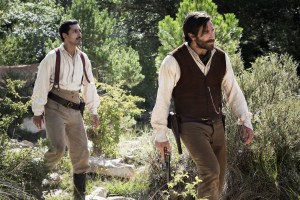
who will provide them with their victim.
Meanwhile, in a town nearby, is the idealistic Hermann Warm (Riz Ahmed) a brilliant scientist who is flat broke. He has an invention that could make him a millionaire. It’s a chemical he claims will make panning for gold easy as pie. On his travels he meets an upper-class adventurer named John Morris (Jake Gyllenhall). Warm likes Morris’s polite relaxed manner and sees him as a genuinely nice  guy. As they travel he share his secret, though not the details, with him. What he doesn’t know is Morris – like the Sisters Brothers – works for the evil Commodore, and that he plans to hand over his erstwhile friend to those killers. But things aren’t necessarily what they seem. The hunters become the hunted with posses tracking the Sisters brothers for their past crimes. The four find themselves on
guy. As they travel he share his secret, though not the details, with him. What he doesn’t know is Morris – like the Sisters Brothers – works for the evil Commodore, and that he plans to hand over his erstwhile friend to those killers. But things aren’t necessarily what they seem. The hunters become the hunted with posses tracking the Sisters brothers for their past crimes. The four find themselves on  the same side, at least temporarily, but who can be trusted?
the same side, at least temporarily, but who can be trusted?
The Sisters Brothers is French director Audiard’s first English language film, and he totally pulls it off. This is an excellent western that captures the frantic expansion of the gold rush towns in the old west with entire settler towns appearing, on-screen. We watch characters discover new technology like toothbrushes and hot-water plumbing. It captures the utopian politics of the time (though completely ignoring the plight of indigenous people). Reilly and Phoenix make great shootists, but it’s Riz Ahmed who really steals the show. The Sisters Brothers (based on Canadian writer Patrick deWitt’s novel), is a wonderful, new take on the classic western.
The Old Man & the Gun, Let the Corpses Tan and The Sisters Brothers — all great movies, though for different reasons — all open today in Toronto; check your local listings.
This is Daniel Garber at the Movies, each Friday morning, on CIUT 89.5 FM and on my website, culturalmining.com.


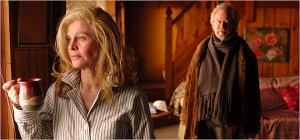


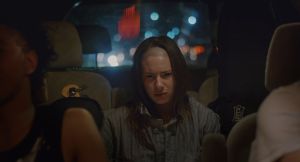
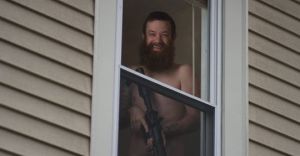


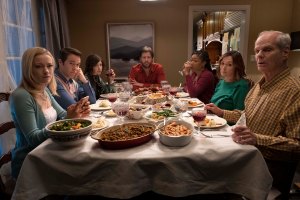



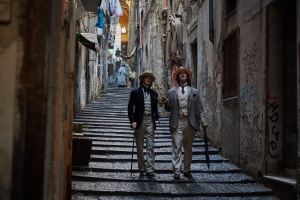




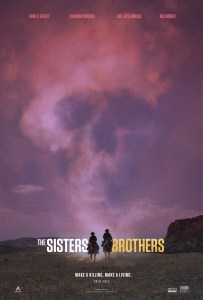
leave a comment